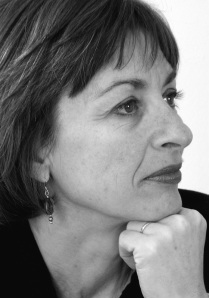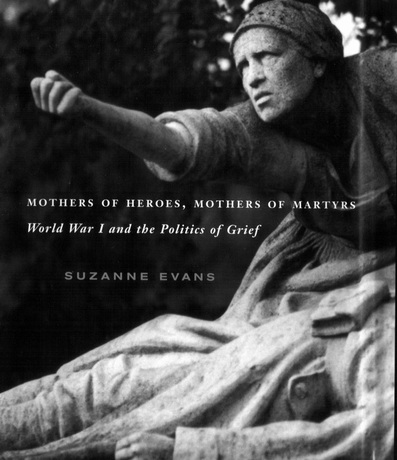I remember as a young woman looking at a picture of a Palestinian woman who had just lost her child to martyrdom but was smiling with a serene pride. This was the first time I had come across the phrases mother of martyr or Intifada smile.
How could a woman show joy over the death of a child?
I could not get the question out of my mind. I later discovered that stories of women who publicly rejoice on the death of a child in support of their community have been told for centuries in the Jewish, Christian, Islamic, and Sikh traditions. There was a depth and complexity to the image of a mother of a martyr that required much more than a passing glance to be understood.
~ from the Introduction by Suzanne Evans
Mothers of Heroes, Mothers of Martyrs: World War One and the Politics of Grief is published by McGill-Queen's University Press.
How could a woman show joy over the death of a child?
I could not get the question out of my mind. I later discovered that stories of women who publicly rejoice on the death of a child in support of their community have been told for centuries in the Jewish, Christian, Islamic, and Sikh traditions. There was a depth and complexity to the image of a mother of a martyr that required much more than a passing glance to be understood.
~ from the Introduction by Suzanne Evans
Mothers of Heroes, Mothers of Martyrs: World War One and the Politics of Grief is published by McGill-Queen's University Press.
A powerful exploration of the role of the mourning mother in war, including an examination of the politics of maternal grief.
~The Globe and Mail
Mothers of Heroes, Mothers of Martyrs...is an important contribution, as it examines how recruiters manipulated familial notions of honour and duty, and the way that ordinary Canadian women subverted their gender norm of life-giving. [It] uses historical precedent to challenge modern assumptions about those who volunteer their children for suicide bombing and essentialist assumptions about women.
-- Canadian Military History
"If they hadn't already been killed or maimed that December of 1915, husbands and brothers and sons were huddling in muddy trenches overseas, their absence a deep shadow over the approaching Christmas holiday. Canadians, especially Canadian women left to tend the home fires, needed hope, consolation, inspiration..." Read Janice Kennedy on Mothers of Heroes, Mothers of Martyrs in The Ottawa Citizen 3 June 2007.
~The Globe and Mail
Mothers of Heroes, Mothers of Martyrs...is an important contribution, as it examines how recruiters manipulated familial notions of honour and duty, and the way that ordinary Canadian women subverted their gender norm of life-giving. [It] uses historical precedent to challenge modern assumptions about those who volunteer their children for suicide bombing and essentialist assumptions about women.
-- Canadian Military History
"If they hadn't already been killed or maimed that December of 1915, husbands and brothers and sons were huddling in muddy trenches overseas, their absence a deep shadow over the approaching Christmas holiday. Canadians, especially Canadian women left to tend the home fires, needed hope, consolation, inspiration..." Read Janice Kennedy on Mothers of Heroes, Mothers of Martyrs in The Ottawa Citizen 3 June 2007.

Suzanne Evans holds a Ph.D. in Religious Studies from the University of Ottawa and is a former research fellow at the Canadian War Museum. She has traveled, lived, worked and studied in many countries including China and India. Her work has appeared in Canadian Military History, The Globe and Mail, The Ottawa Citizen, Ottawa Magazine, Canada's History Magazine (formerly The Beaver), The New Quarterly, Numen, The Journal of Psychology and Judaism, and Public. She lives in Ottawa, Canada.

